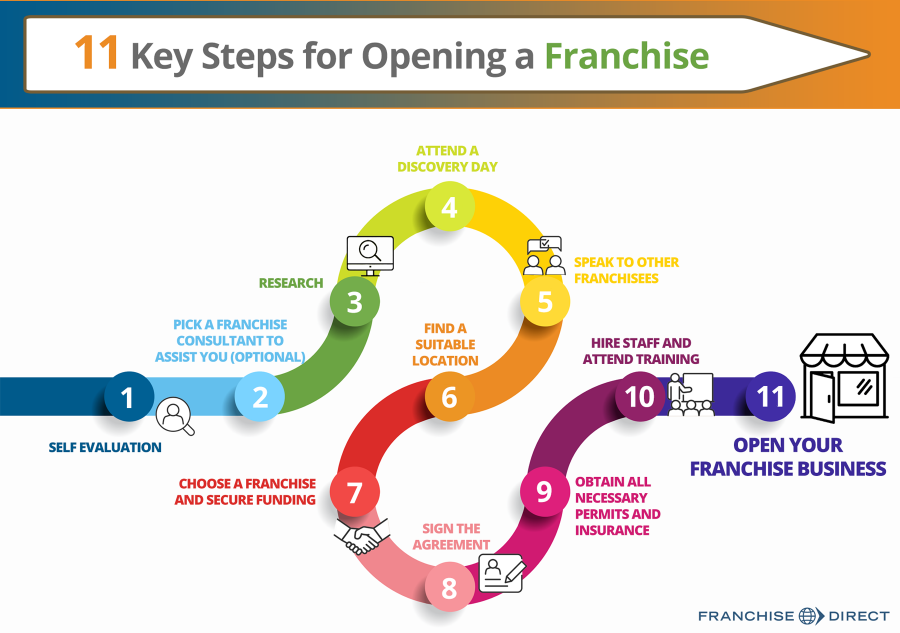
🕒 Estimated reading time: 5 min.
Owning a franchise is much less risky than starting your own business but getting started is often the hardest place to begin. Opening your own franchise business is a BIG step – and it can be somewhat intimidating. The franchise marketplace is filled with innumerable franchise systems in a vast range of industries.
This infographic gives anyone taking on the challenge and adventure that comes with opening a franchise business an overview of the major steps along the way. Please note that the investment process and timeline can vary a little from company to company.


Self-Evaluation
What appeals to you about opening a franchised business? Are you ready, willing and able to work long hours, including weekends and holidays (especially in the beginning)? Can you commit to following pre-determined business methods with very little variation, if any variation at all? Can you accept paying a portion of your profits to another entity (the franchisor)? Are you comfortable with the reputation of your business being largely dependent on the franchise’s network and not just your business unit? Furthermore, how much of your personal cash are you willing to part with to establish the business? Unless you’re fortunate enough to have enough money personally, do you have adequate assets (savings accounts, real estate, securities, etc.) to secure a loan?

Pick a Franchise Consultant to Assist You (Optional)
Despite all of the information available online, it’s still a good idea to enlist the help of a franchise consultant to guide you through the process. Much like an estate agent is a good ally in the purchase of a home, a franchise consultant has industry-specific knowledge and can relate possibly complicated topics (including the content of agreement and disclosure documents) to you in a more understandable way. A franchise consultant could also keep you from experiencing pitfalls that may occur without their expertise.

Research
What kinds of business can your area sustain – and are they the types of business you’re interested in opening? Your common sense and gut feelings are good guides to figuring out what businesses are and could be sustainable in your locale, plus the franchisor should provide access to relevant statistics and other data. Use the info gathered to match up your personal situation and the business environment of your area with a suitable franchise system. Once you’ve narrowed your search down to a few strong contenders, request a franchise application from each of those companies. When you submit your details to the company they should send you a copy of their information pack. This should give an even deeper look into their business model.

Attend a Discovery Day
A Discovery Day is an in-depth meeting between the franchisor and one or more franchisees. It can take place at a local outlet, but most likely will happen at the company’s corporate office. Often the potential franchisee(s) in attendance can ask questions, and will see presentations about what the franchisor can offer. If done at the corporate office, a tour of the different departments and introductions to franchisee training and support personnel are common.


Speak to Other Franchisees
The franchisor should provide you with the details of current franchisees who you can speak to as part of the ‘franchise validation’ process. Find a few who are close to you and pay them a visit. Are they satisfied with the franchisor’s support? Is the reality of the business in line with the expectations (financially and otherwise) that they had prior to joining?

Find a Suitable Location
If you accidentally locate in a low traffic area or a region where there are no complementary businesses around, how are you going to get customers? The franchisor will delineate certain parameters for your territory. In addition, most franchisors assist with site selection. If you choose a suitable place for business on your own, the franchisor will have to approve your location before you can move forward.

Choose a Franchise and Secure Funding
After you’ve completed your research, it’s time to make the big decision – which franchise system will you invest in? Once you have decided, you’ll have all of the information necessary to complete a business plan and present it to potential lenders. There are numerous financing options out there for you to consider: bank loans, small business loans provided by the government, personal loans from friends and family, etc. Remember, you’ll need enough cash reserves to cover expenses until the business begins to turn a profit, which in some cases can be months after opening.

Sign the Agreement
Some franchisors are more flexible about negotiating certain terms in the franchise agreement (like lease parameters). If that's the case, it’s a good idea to seek counsel from a lawyer with franchise-specific experience to find the best solutions for your particular situation. If the franchisor's agreement is more rigid, it isn’t a cause for concern. Remember, franchises are based upon a proven system and the consistency of the brand. If the franchise agreement for the brand you chose is overly negotiable, it could be a sign that the business is in trouble, and a cause for deeper investigation.

Obtain All Necessary Permits and Insurance
Each industry has its own requirements for permits and insurance. Regulations by city, county, etc. will vary as well. The franchisor will probably have background knowledge of the permits and insurance needed to operate their business system. However, it’s a good idea to check with local authorities to ensure compliance.

Hire Staff and Attend Training
One of the most appealing aspects of franchising for those wanting to open a business is the training component. The number of staff members needed to run the operation will depend on the type of franchise chosen, but franchisors usually provide training (a combination of classroom and practical experiences) to the franchisee and at least one other manager. A copy of the operations manual is also typically presented at this time.

Open Your Franchise Business
You will need to make potential customers aware of their new marketplace option. Franchisors will often have defined processes for signage, ads, and other initiatives to be performed. Some franchisors will do a 'soft opening' before the 'grand opening'. A soft opening is designed to smooth out problems in the operation of the business before the grand opening's big marketing blitz and (hopefully) larger crowds arrive. Some franchisors also arrange for a corporate trainer to be on hand at the franchise location during the opening days.
Check out our fantastic range of franchise opportunities right here!














